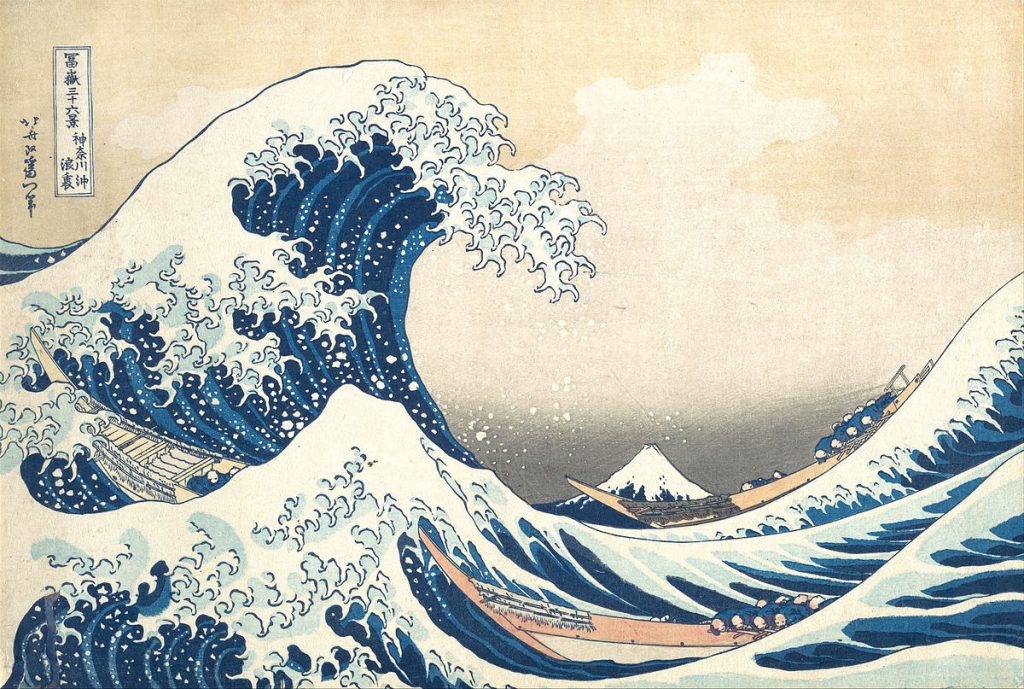What do you suppose would happen if Buddhism were to be brought to China, and then introduced to the samurai warriors of Japan? If you answered that Zen Buddhism would be created, then you’re correct. The Chinese, especially the Taoists, were intrigued by Buddhism’s profound philosophy, dialects, analyses, and speculations. However, Buddhism’s advocacy of a homeless life, world-fleeing, and life-denying tendencies did not mesh with the Chinese people’s worldly and practical centered lives.

Keeping with Buddhism’s made idea of achieving Nirvana, Zen focuses on achieving Satori (さとり) (enlightenment). Instead of focusing on escaping the cycle of rebirth, Zen focuses on finding meaning in everyday activities such as eating, working, and business etc. The meaning revealed to us is in being itself, or isness, often referred to in Japanese as kono-mama (この-まま) or sono-mama (この-まま). Another characteristic of Zen is that is does not deal with the abstract. A Zen-man will have no need for instruments of other media to express his art. Instead, upon achieving Satori (さとり), a Zen-man will become privy to a world of wonders and miracles 1, and his art will be expressed through the transformation of his life into a world of creation.2 Ultimately, a person will not escape the cycle of rebirth. Rather, they continue to be reborn so that they may help others achieve Satori (さとり) through Zen. The Chinese developed Zen as a form of Buddhism that focused more heavily on the physical and living world rather than a different one.
This explains how Zen came about but, how did it make its way to Japan? Japan and China had a big brother little brother relationship. China was the larger and more powerful country with a plethora of resources at its disposal, whereas Japan was an island nation that had limited resources available to itself. Because of this, Japan frequently traded goods and ideas with China. Through continuous trade, Japan would adopt many of China’s farming practices, its calendar system, and their written language, also known as Kanji. Even the Japanese government would import laws and other ideas from the Chinese government, even going so far as to send students and government officials to study from Chinese officials. Over time, Japan’s culture would become very similar to China’s own, by becoming much more focused on the living world rather than the afterlife. It was through this trade relationship that the twelfth-century Buddhist priest Eisai journeyed to China. Upon his return, Eisai brought with him Buddhism’s newest school of thought to Japan and began introducing Zen to the Kyoto area.3

However, Zen was not the first form of Buddhism introduced to Japan. While there is some debate over the exact time when Buddhism was first introduced to Japan, the most commonly agreed upon time frame is 500 to 550 C.E. Because the older schools of Buddhism were already well established in the Kyoto region, Zen struggled to gain popularity. Eisai was forced to take a conciliatory stance in relation to the older schools of Buddhism, and diplomatically garnered favor with the Imperial Court. After his peaceful attempts to spread Zen were met with violence, Eisai traveled back to the Kamakura region, home of the Hojo government (1200-1330). It was here in the Hojo government that Eisai was able to spread Zen to a wider audience.4
The Hojo Government was known for being a militaristic regime.5 The most well-known member of the Hojo family was Hojo Tokimune. Tokimune is widely considered one of Japan’s greatest historical figures for his successful quelling of the Mongol invasions. Tokimune was only thirty-two at the time of his death, but in his short life, Tokimune dedicated himself to the study of Zen and erected temples for the Chinese Zen masters in Japan. Due to his revered status and position in the Hojo regime, many of the lower ranking generals and samurai adopted Zen both as a way to honor their fallen leader and because living a Zen life was thought to be the way a samurai should live his life.

Zen has its strongest connection to the samurai through the famous Bushido Code, also known as the way of the warrior, which is the code samurai live their lives by. A samurai that follows the Bushido Code values loyalty, filial piety, and kindness above all else. However, to live this life, a samurai must clear his mind of all other distractions, including the fear of death. To be an infallible guardian that their masters expected them to be, a samurai had to only concern himself with living, or isness, and in doing so would find Zen and achieve Satori (さとり). For a samurai, living by the Bushido Code and being their master’s almighty guardian was best achieved through living a Zen life and achieving Satori (さとり). Funny how it was the blending of an Indian religion with Chinese ideas that helped the Japanese samurai live a life more in line with their warrior code.
- Ichirou Ishida and Delmer Brown, “Zen Buddhism and Muromachi Art, The Journal of Asian Studies, Vol. 22, No. 4 (Aug., 1963): 419 ↵
- Wm. Theodore de Bary, Donald Keene, George Tanabe, and Paul Varley, Sources of Japanese Tradition 2nd ed., vol. 1 (New York: Columbia University Press, 2001), 321-324. ↵
- Encyclopedia of Religion, 2005, s.v, “Buddhism: Buddhism In Japan,” by Brian O. Ruppert ↵
- E. Dale Saunders, Buddhism in Japan With an Outline of Its Origins in India (Great Britain, India, Pakistan: Oxford University Press London, Bombay, and Karachi, 1964), 94. ↵
- Daisetz T. Suzuki, Zen and Japanese Culture (New York: Pantheon Books Inc., 1960), 62. ↵



39 comments
Donte Joseph
I had very little knowledge of Zen Buddhism but reading it has given me a new insight on life. I love that in Zen Buddhism, the focus is on living in the moment because I think that is important. People tend to miss what is going on around them because they are dwelling on the past or stressing on the future, so I think a belief that engulfs the need to live in the present is amazing. Overall an amazing read in my opinion.
Valeria Perez
Before this article I had very limited knowledge surrounding the ideas of Zen but it sounds very interesting. I like the ideas Zen Buddhism has about living life in the moment and not to live life “somewhere else”. What I do not understand is why did people in Kyoto get so violent towards Zen? The dedication that Samurai warriors had to the code is amazing. They had to be warriors who did not fear death. Getting to Satori must have taken a very long time.
John Smith
Zen Buddhism sounds intriguing. I have always been a fan of samurai flicks, so it’s exciting to learn more about the religion that drives their lifestyle. However, this article has also made me think about western Vs Eastern religions and how different they are. Not to mention how different western Vs eastern warriors are. What would a Catholic samurai look like or a Buddhist minuteman?
Christopher Vasquez
Cultural diffusion is always a great thing; Japan learning from China and incorporating their ideas into their own way of life shows that Japan admired China’s perspective on many aspects of life. Focusing on the here and now as opposed to the afterlife seems to be a reversal of most religions, where the afterlife is given most of the priority. I found it interesting that Eisai, having been met with violent protests, found a wider, more receptive audience with the Japanese militants: the samurai. The fact that Zen was derived from Buddhism in China and became something known as the Bushido Code (Way of the Warrior) shows how one idea can influence the world.
Cooper Dubrule
Reading this article really clarified a lot of things about Buddhism for me. I had never known of its ties to the samurai and the Bushido codes. I like the way Buddhism focuses more on the present and physical world which I think is unique in belief systems. What i liked most about this article is how it branched off into the different influences the forms of Buddhism had on China and Japan and eventually the culture of them.
Martina Rodriguez
I love how the article opens up with a very detailed retelling of how exactly Buddhism made its way to Japan. I’m glad the author provided such detail because I would have never guessed that such different cultural beliefs could travel such distances and be integrated so well into such a different society and culture. Loved the concluding sentence, it was the perfect finish to an article that, based off its heading, had so many seemingly unrelated aspects to cover.
Suvesh Vasal
This article was very informative about the differences in Buhdism. I had not really known there was a difference. Anyways, not only was the article informative, but it was explained in a detailed and concise manner that made it easy to follow along. The way this was written allowed me to actually get interested reading it, instead of just skimming over the article.
Andrew Dominguez
Before this article i wasn’t aware there were differences in Buddhism, but this article did well at explaining the differences. What i found interesting is solders of lower class would adopt a religion different than the one in which they normally practiced. This must be a great since of accomplishment, if you were so worthy to have people change the way they think in order to honor you.
Isaac Saenz
This was a great explanation of an adaptation of Buddhism. Zen Buddhism according to this article is more of a way of life that considers others instead of the original Buddhism that worries only about one’s own enlightenment. I much prefer this Zen method and can see how Samarui followed this same code. Loyalty, filial piety, and kindness were very much necessary to be a warrior and protector of the emperor.
Fumei P.
I didn’t know that there were different schools or thoughts of Buddhism, Zen Buddhism is a concept to me. I was only familiar to traditional Buddhism, where followers try to reach Nirvana and view life as suffering and temporary and needing to let go of all Earthly desires to reach that state. This is a refreshing view on Buddhism, where Zen Buddhists take life one day at a time a focus on the meaning of living instead of the afterlife.